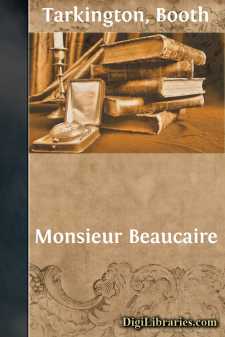Categories
- Antiques & Collectibles 13
- Architecture 36
- Art 48
- Bibles 22
- Biography & Autobiography 813
- Body, Mind & Spirit 142
- Business & Economics 28
- Children's Books 13
- Children's Fiction 10
- Computers 4
- Cooking 94
- Crafts & Hobbies 4
- Drama 346
- Education 46
- Family & Relationships 57
- Fiction 11828
- Games 19
- Gardening 17
- Health & Fitness 34
- History 1377
- House & Home 1
- Humor 147
- Juvenile Fiction 1873
- Juvenile Nonfiction 202
- Language Arts & Disciplines 88
- Law 16
- Literary Collections 686
- Literary Criticism 179
- Mathematics 13
- Medical 41
- Music 40
- Nature 179
- Non-Classifiable 1768
- Performing Arts 7
- Periodicals 1453
- Philosophy 64
- Photography 2
- Poetry 896
- Political Science 203
- Psychology 42
- Reference 154
- Religion 513
- Science 126
- Self-Help 84
- Social Science 81
- Sports & Recreation 34
- Study Aids 3
- Technology & Engineering 59
- Transportation 23
- Travel 463
- True Crime 29
Booth Tarkington
Booth Tarkington was an acclaimed American novelist and playwright, best known for his novels "The Magnificent Ambersons" and "Alice Adams," both of which won the Pulitzer Prize for Fiction. Born in 1869 in Indianapolis, Indiana, Tarkington's works often depicted life in the Midwest during the early 20th century, capturing the social and economic changes of the era. His rich characterizations and keen observations of American life made him one of the most popular and significant authors of his time.
Author's Books:
Sort by:
by:
Booth Tarkington
Chapter One Nothing could have been more painful to my sensitiveness than to occupy myself, confused with blushes, at the center of the whole world as a living advertisement of the least amusing ballet in Paris. To be the day's sensation of the boulevards one must possess an eccentricity of appearance conceived by nothing short of genius; and my misfortunes had reduced me to present such to all...
more...
by:
Booth Tarkington
I WILLIAM William Sylvanus Baxter paused for a moment of thought in front of the drug-store at the corner of Washington Street and Central Avenue. He had an internal question to settle before he entered the store: he wished to allow the young man at the soda-fountain no excuse for saying, "Well, make up your mind what it's goin' to be, can't you?" Rudeness of this kind,...
more...
by:
Booth Tarkington
BOSS GORGETT I guess I've been what you might call kind of an assistant boss pretty much all my life; at least, ever since I could vote; and I was something of a ward-heeler even before that. I don't suppose there's any way a man of my disposition could have put in his time to less advantage and greater cost to himself. I've never got a thing by it, all these years, not a job, not a...
more...
by:
Booth Tarkington
Chapter I Major Amberson had "made a fortune" in 1873, when other people were losing fortunes, and the magnificence of the Ambersons began then. Magnificence, like the size of a fortune, is always comparative, as even Magnificent Lorenzo may now perceive, if he has happened to haunt New York in 1916; and the Ambersons were magnificent in their day and place. Their splendour lasted throughout...
more...
by:
Booth Tarkington
ACT I ANDREW GIBSON'S _office in his piano factory where he manufactures "The Gibson Upright." A very plain interior; pleasant to the eye, yet distinctly an office in a factory, and without luxuries; altogether utilitarian. Against the wall on our right is a roll-top desk, open, very neat, and in the centre of the writing pad a fresh rose stands in a glass of water. Near by is a long,...
more...
by:
Booth Tarkington
THE FIRST ACT SCENE: The terrace of the Hotel Regina Margherita, on the cliff at Sorrento, overlooking the Bay of Naples. There is a view of the bay and its semi-circular coast-line, dotted with villages; Vesuvius gray in the distance. Across the stage at the rear runs a marble balustrade about three feet high, guarding the edge of the cliff. Upon the left is seen part of one wing of the hotel,...
more...
by:
Booth Tarkington
Chapter One The young Frenchman did very well what he had planned to do. His guess that the Duke would cheat proved good. As the unshod half-dozen figures that had been standing noiselessly in the entryway stole softly into the shadows of the chamber, he leaned across the table and smilingly plucked a card out of the big Englishman's sleeve. "Merci, M. le Duc!" he laughed, rising and...
more...
by:
Booth Tarkington
CHAPTER I A BOY AND HIS DOG Penrod sat morosely upon the back fence and gazed with envy at Duke, his wistful dog. A bitter soul dominated the various curved and angular surfaces known by a careless world as the face of Penrod Schofield. Except in solitude, that face was almost always cryptic and emotionless; for Penrod had come into his twelfth year wearing an expression carefully trained to be...
more...
by:
Booth Tarkington
CHAPTER I. THE YOUNG MAN WHO CAME TO STAY There is a fertile stretch of flat lands in Indiana where unagrarian Eastern travellers, glancing from car-windows, shudder and return their eyes to interior upholstery, preferring even the swaying caparisons of a Pullman to the monotony without. The landscape lies interminably level: bleak in winter, a desolate plain of mud and snow; hot and dusty in summer,...
more...
by:
Booth Tarkington
I. A Change of Lodging The glass-domed "palm-room" of the Grand Continental Hotel Magnifique in Rome is of vasty heights and distances, filled with a mellow green light which filters down languidly through the upper foliage of tall palms, so that the two hundred people who may be refreshing or displaying themselves there at the tea-hour have something the look of under-water creatures playing...
more...











